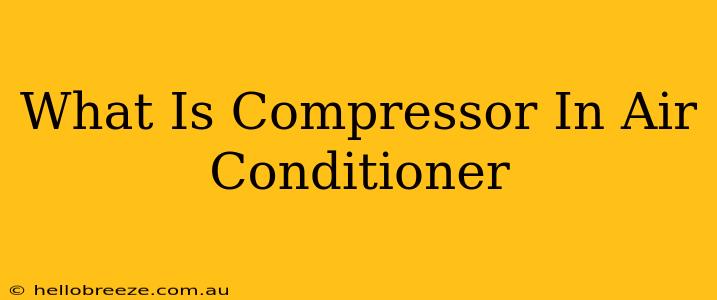The air conditioner compressor is the heart of your cooling system. Understanding its function is key to understanding how your AC keeps you cool and comfortable. This comprehensive guide will explain what a compressor is, how it works, and why it's so vital.
Understanding the Role of the Compressor
Simply put, the compressor is the powerful pump that circulates refrigerant throughout your air conditioning system. Refrigerant is a special fluid that absorbs heat from inside your home and releases it outside. Without the compressor, this crucial process wouldn't happen.
Think of it like this: the refrigerant is like the blood in your body, carrying heat. The compressor is the heart, pumping that "blood" (refrigerant) around the system to effectively cool your space.
The Compressor's Crucial Function: The Refrigeration Cycle
The compressor plays a vital role in the refrigeration cycle, which involves four key stages:
-
Suction: The compressor sucks in low-pressure, low-temperature refrigerant gas from the evaporator coil (located inside your home).
-
Compression: This is where the compressor's power comes into play. It compresses the refrigerant gas, significantly increasing its pressure and temperature.
-
Condensation: The high-pressure, high-temperature refrigerant gas flows to the condenser coil (located outside your home). Here, the heat is released into the outside air, causing the refrigerant to condense into a liquid.
-
Expansion: The now liquid refrigerant flows through an expansion valve, where its pressure and temperature drop significantly. This low-pressure, low-temperature refrigerant then enters the evaporator coil, ready to absorb heat from inside your home, starting the cycle anew.
Types of Air Conditioner Compressors
Several types of compressors are used in air conditioners, each with its own advantages and disadvantages:
-
Reciprocating Compressors: These are the most common type, utilizing a piston to compress the refrigerant. They are known for their reliability and relatively low cost.
-
Scroll Compressors: These compressors use two spiral-shaped plates to compress the refrigerant. They are quieter and more efficient than reciprocating compressors, but can be more expensive to repair.
-
Rotary Compressors: These use a rotating vane to compress the refrigerant. They are often found in smaller air conditioners and are known for their compact size and high efficiency.
Common Compressor Problems & Troubleshooting
While robust, air conditioner compressors can eventually malfunction. Some common problems include:
-
Compressor Failure: This often requires a complete compressor replacement, a costly repair.
-
Overheating: This can be due to various factors, such as dirty condenser coils or refrigerant leaks.
-
Excessive Noise: Unusual noises could indicate a problem with the compressor bearings or other internal components.
Troubleshooting Tips: If you suspect a problem with your air conditioner compressor, it's crucial to contact a qualified HVAC technician. Attempting DIY repairs can be dangerous and could further damage your system.
Maintaining Your Air Conditioner Compressor for Longevity
Regular maintenance can significantly extend the lifespan of your air conditioner compressor:
-
Annual Tune-Ups: Professional tune-ups can identify potential problems early on, preventing costly repairs.
-
Clean Condenser Coils: Regularly clean the outdoor condenser coils to prevent overheating and improve efficiency.
-
Check Refrigerant Levels: Low refrigerant levels can strain the compressor and lead to premature failure.
In conclusion, the compressor is the essential component that drives your air conditioner's cooling power. Understanding its function and importance can help you maintain your system effectively and enjoy years of cool comfort. Remember to always consult a professional for any repairs or maintenance beyond simple cleaning.

